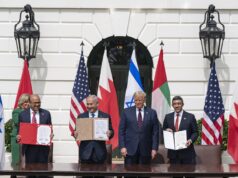U.S. Secretary of State Hillary Clinton on Friday called for Israelis and Palestinians to move “forward with refocused goals and expectations” despite the setbacks in negotiations experienced under President Obama over the last two years. Speaking at a conference at the Saban Center for Middle East Policy in Washington, Clinton noted that the United States will “not be a passive participant” and asked the sides to show more flexibility on the core issues, “borders and security; settlements, water and refugees; and on Jerusalem itself.”
Clinton noted that she has already asked both parties to begin grappling with such issues, and that the U.S. “will push the parties to lay out their positions…without delay and with real specificity. And in the context of our private conversations with the parties,” she continued, “we will offer our own ideas and bridging proposals when appropriate.”
This is certainly a shift in policy for the Obama administration – and for the better. Rather than a public focus on non-issues such as Israeli settlements, the administration, according to Clinton, will talk to both sides behind closed doors and negotiate the conflict’s core issues.

U.S. Secretary of State Hillary Clinton speaks at the Saban Center on December 10, 2010. |
|
Perhaps even more importantly, however, is that reading between the lines reveals that the Obama administration will place Israeli-Palestinian negotiations on the back-burner for now. Clinton reminded those gathered: “The United States and the international community cannot impose a solution…The parties themselves have to want it. The people of the region must decide to move beyond a past that cannot change and embrace a future they can shape together.”
Since Oslo’s collapse in 2000, the United States has pushed the Israelis and Palestinians towards peace negotiations with varying degrees of both urgency and success. But negotiations cannot and will not succeed unless both parties take ownership of the process and strive for peace for peace’s sake – not to appease the United States and international community. Sure, indirect talks will be held in private – a positive change – but negotiations will no longer be a main priority for the administration until both sides show they are willing to take the lead and show ownership.
Perhaps President Obama has learned important lessons in conducting Middle East peace talks – but many of these lessons should have been apparent from the start given the long history of U.S. involvement in Israeli-Palestinian negotiations. Whether the decision to try a new approach is a product of a realistic assessment that a peace is not in the offing today, or merely a recognition that his approach guaranteed the current paralysis so he must make his mark on foreign policy elsewhere, only time will tell.





